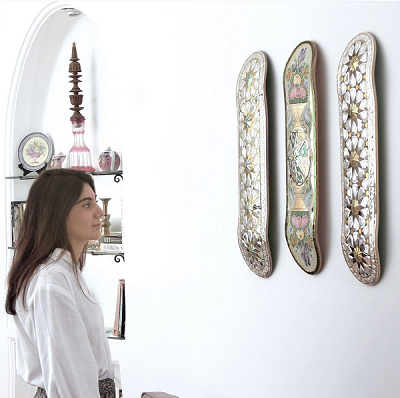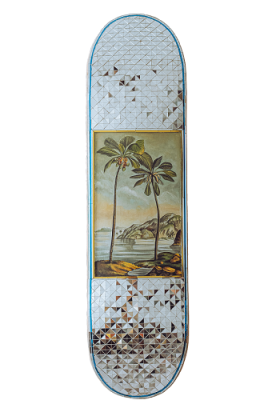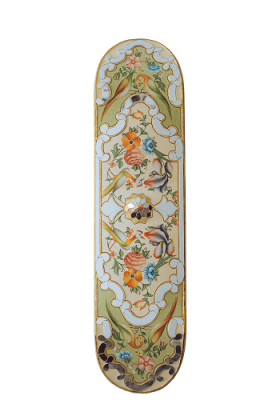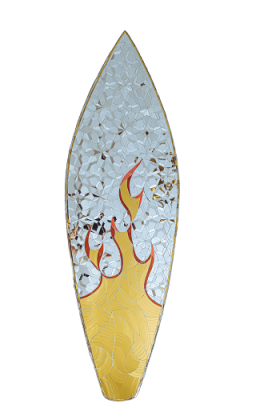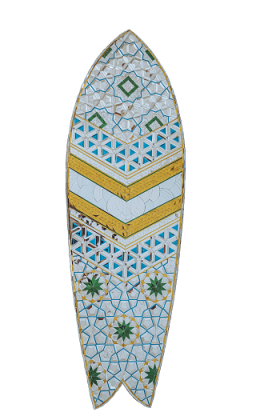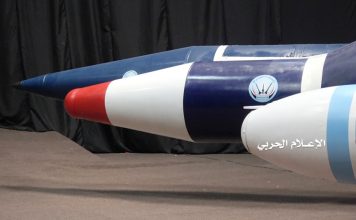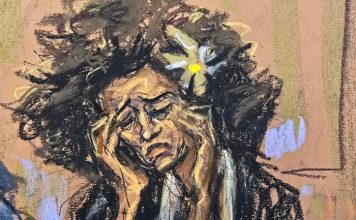By Nazanine Nouri
Skateboards are not a medium that you would readily associate with Persian craftsmanship. Yet the two overlap successfully in the works of the Iranian-American artist Leila Nazarian, who is showing her work at the Galerie Nicolas Flamel in Paris starting this week.
“Eclectic Decks” explores themes of cross-cultural exchange by juxtaposing skateboards with traditional Iranian craftsmanship.
Our collaboration with Leila Nazarian began a few years ago after we met in Tehran in January 2022,” explained Yassi Metghalchi, Galerie Nicolas Flamel’s co-director. “Her art was very representative of what the gallery aimed to show from the start: a better understanding of Iran, of its culture and history. An Iran different from the one we see in the news.”
Hessam Khalatbari, Galerie Nicolas Flamel’s other co-directo, explained that the gallery wanted to show a mixture of Persian heritage on a modern medium like a skateboard or surfboard. He added that each one of Nazarian’s pieces is a unique edition, and that it took months for each piece to be finished and for the artist to be satisfied by the final result.
Nazarian was born in Santa Monica and spent most of her childhood in Palm Beach, Florida before returning to Iran with her family at the age of 11. After obtaining a Bachelor of Arts in International and Comparative Politics with a minor in Fine Arts, and a Master of Arts in Middle Eastern Studies from the American University of Paris, she moved back to California where she earned a second master’s degree in Public Diplomacy from the University of Southern California.
It was during her graduate studies that she took a course in “Cultural Diplomacy” and realized that art and culture could be a framework for diplomacy.
With a personal stake in improving cultural understanding between her home country, the United States, and her parents’ homeland, Iran, and having lived in the birthplace of skate culture, she embarked on a new concept: juxtaposing this iconic object from her hometown in California with traditional Iranian craftsmanship.
After receiving positive feedback for a few custom-made skateboards she had designed that were unlike any other on the market (Persian-inspired designs were screen-printed onto skateboard decks which could be used as actual skateboards), she decided to turn this concept into a business. In 2015, she founded Eclectic Decks – a contemporary art and lifestyle brand that showcases traditional artforms on modern mediums – creating skateboards and surfboards that fuse traditional art forms on a modern-day platform.
Nazarian’s first collection took its inspiration from traditional Persian tilework, including a design from the Qajar era. For her later collections, she commissioned artisans in Iran to adorn her Southern California-made skateboard and surfboard decks with intricate, traditional handcrafted designs including Persian marquetry [Khatamkari], Persian mirror work [Ayne Kari] and Persian metal embossing [Ghalamzani]. Her collections also include the popular motif of “Flower and Nightingale” [Gol o Bolbol].
Nazarian shed some light on her work in a recent interview with Kayhan Life.
Where did you get the idea to merge the two cultures you grew up in – Persian and Californian – in the form of art on skateboards?
It was during a class titled ‘Cultural Diplomacy’ at the University of California that the idea really came to me. The concept of using culture as a powerful tool in building bridges between people and reinforcing mutual understanding stood out as a compelling approach. As an Iranian-American born in California, I have always been interested in cross-cultural juxtapositions that merge the two cultures I grew up around and the skateboard became the perfect medium to explore this fusion.
Your works incorporate ancient Persian crafts and traditions – such as mirror work, Khatamkari, Ghalamzani – as well as motifs such as ‘gol o bolbol’ on a medium that is completely unexpected. Somehow you make the skateboards look like they are part of an original Persian work. How did you develop this concept and was it hard to begin with?
Initially, I faced challenges trying to create a piece that looked and felt harmonious rather than forced. I try to honor the way these crafts were originally made while also giving them a modern twist which you will see with several of my latest pieces, such as the surfboards we made for my solo exhibition at Galerie Nicolas Flamel. I drew inspiration from traditional mirror work compositions as well as retro surfboard patterns from the 1980s in California.
How are collectors and galleries and Iranian communities worldwide reacting to the work?
So far I have received overwhelmingly positive feedback from the Iranian community, particularly within the diaspora. Through my conceptual approach, I hope to broaden viewers’ perception of what craft and art can look like.
Galerie Nicolas Flamel was founded in 2009 by Fathali Metghalchi and Kimya Derambakhsh. Since 2013, it has been co-directed by Hessam Khalatbari and Yassi Metghalchi and has been totally dedicated to modern and contemporary Iranian art, with works from both emerging and prominent Iranian artists. The gallery is located in the Marais district of Paris, within walking distance of the Centre Pompidou.

